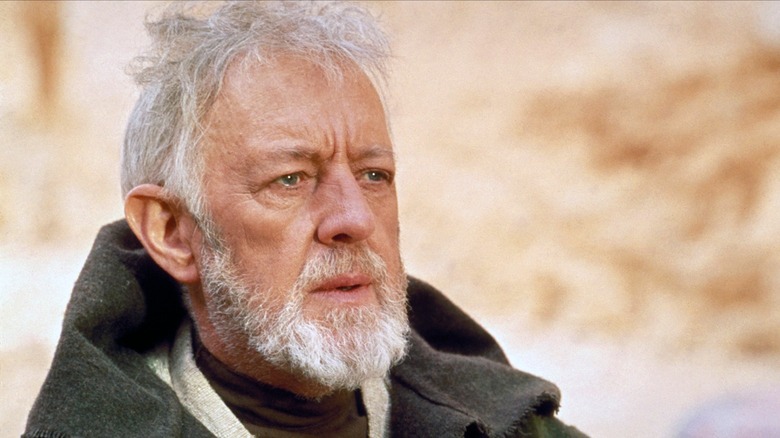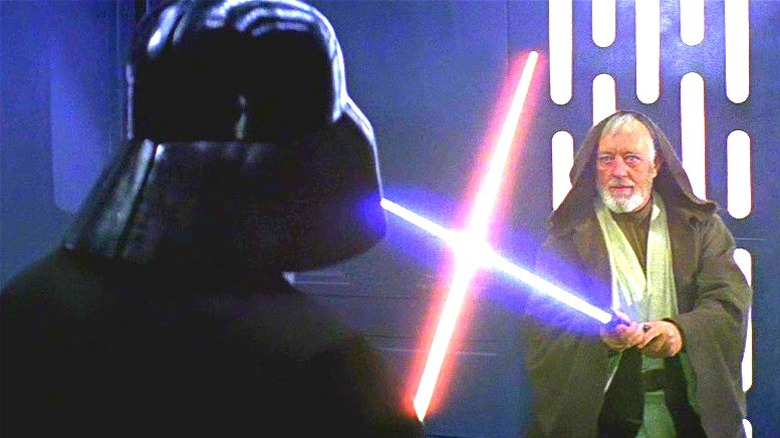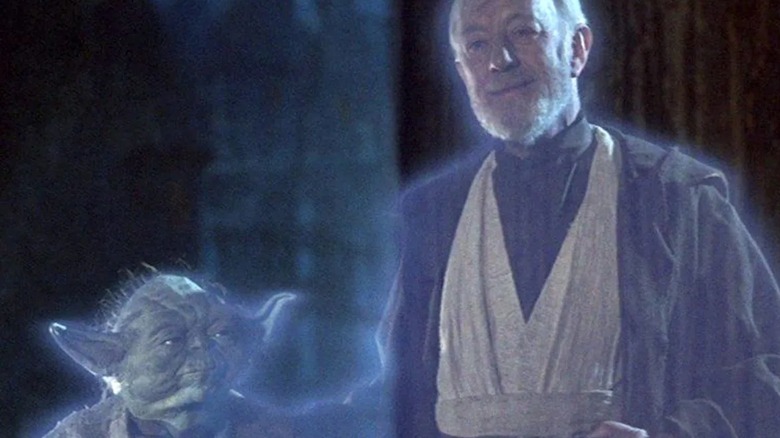Obi-Wan Kenobi Stuck Around Longer In George Lucas' Original Star Wars Script
The core cast in George Lucas' original "Star Wars" trilogy is one of the most famous and enduring adventure squads in all of pop culture. Each character fulfills an essential fantasy archetype, yet brims with personality. Obi-Wan Kenobi, for example, acts as the mentor to hero Luke Skywalker, his compassion and wisdom serving as a model for the protagonist to follow on his spiritual journey. Luke's ties with Kenobi make it especially tragic when Obi-Wan meets his demise at the hands of enemy Darth Vader, which is why it's probably for the best that Lucas didn't spare his life in "A New Hope" as he had originally planned.
"Star Wars" today is a massive franchise with three separate trilogies and a host of television series, but Lucas was taking it one step at a time in the very beginning as he initially wanted his gigantic original story to fit into one film. Luckily, the success of "A New Hope" spawned sequels that completed Lucas' plans, but his writing process for the initial film entailed creating a tight space opera that could stand on its own. In order to create the strongest emotional impact for the sake of Luke's arc, it was necessary to kill off Obi-Wan. Of course, Kenobi would come back as a force ghost in the follow-up films, and Luke would get another master sage in the form of Yoda, but in the context of "A New Hope," there was nothing left for his character to do after Luke and the gang escaped the Death Star.
The killing of Kenobi
According to Lucas, the original "Star Wars" draft had Obi-Wan witnessing the Death Star dogfight, and continuing on into the hypothetical rest of the trilogy. However, faced with the necessity to condense his story, he realized that Kenobi's arc ended before the final act of the film. Lucas observed:
"In the process of rewriting that script, and thinking of it as only a movie and not a whole trilogy, I decided that Ben Kenobi really didn't serve any useful function after the point [when] he fights Darth Vader. Although in that draft he continued on through the air battle at the end, and then he continued on through the whole script, the other two stories. But when I took one [story] and I looked at it I said, 'You know, he just stands around for the last twenty five percent of the film, watching this air battle go on, and he really has no real function, and it'd probably be much more satisfying, powerful, and interesting if he, if Darth Vader were to kill him, or he would go into a different form.' I made that decision based on just working on 'Star Wars' ['A New Hope']."
Obi-Wan forever
George Lucas goes on to compare his decision to replace the originally planned Wookies with Ewoks in "Return of the Jedi," since both creative choices were the result of having to shorten his initial three-part story conception to one entry. Chewbacca's role as the co-pilot of a spaceship made it seem as if the Wookies weren't as "primitive" as Lucas had initially planned, so the Ewoks fulfilled their role as a technological foil to the more advanced Empire instead. Likewise, Yoda, who was "older and wiser and shorter than Ben [Kenobi]" replaced Obi-Wan as Luke's mentor. The decision ultimately helped the longevity of the series, as Obi-Wan Kenobi and Yoda both became iconic characters in their own right. Kenobi's exit from "A New Hope" doesn't detract from the character's legacy, and in fact makes the finale even more memorable during the famous "Use the force, Luke" line before the hero blows up the Death Star. Like Luke himself, audiences could feel Obi-Wan's presence throughout the entire "Star Wars" saga.


